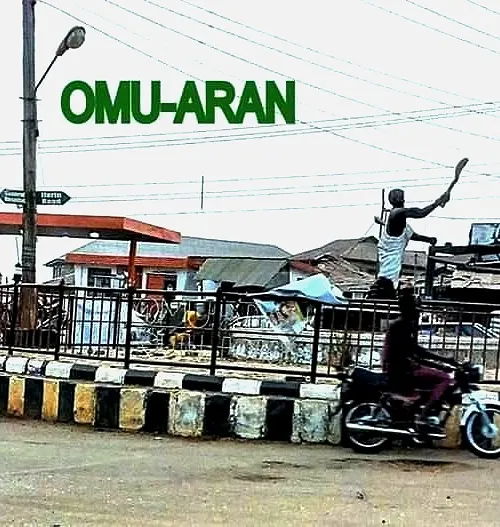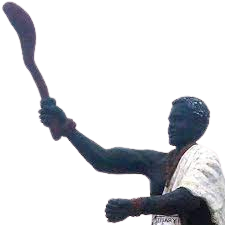HISTORY OF OMU-ARAN

Omu Aran ..the Custodian of Ogbo
Omu-aran the head of Igbomina Land is situated in Kwara State, in the Middle belt of of Nigeria. The erstwhile headquarter of Igbomina/Ekiti Division in the then West Central State now known as Kwara State and presently the headquarters of Irepodun Local Government Area. Founded over 500 years ago, omu-Aran community came into being as a result of outward movement from Ile-Ife. Omu-Aran is situated some eighty (80) kilometers south east of Ilorin the State capital and approximately on Latitude 8° 8″ north of the Equator and Longitude 5° 6″ east of the Greenwich Meridian. The town equally serves as the headquarters of the Kwara South Senatorial District consisting of seven LGAs comprising Ekiti, Ifelodun, Irepodun, Isin, Oke Ero, Offa and Oyun LGAs.
The history of Omu-Aran town can not be completed without relating it to its place in Igbomina land history and to the larger Yoruba race and Ile-ife, the cradle of Yoruba Civilization.
One of the characteristics that brought Omu-Aran to the world is the housing of “OGBO” an object curve like a big knife that signifies ”the direction”. One wh has this object leads the way, Omu Aran is known as the Custodian of Ogbo which symbolizes unity, power, leadership, and love among its people. It was said about this instrument to represent the most cherished truth of the period. Ogbo is translated as ”Ogbo knows the way” called Ogbomona which is (now) called Igbomina..
The history of Omu-Aran town can not be completed without relating it to its place in Igbomina
The adoption of this recommendation led to the departure of princes and selected leaders from Ile-Ife to other places, they were given royal blessings and symbol of authority. Many Yoruba kingdoms of today arose as a result of this emigration. From this emigration emerged the personality of an Ife Warrior by name Olomu-Aperan who became the progenitor of the Igbomina town of Omu-Aran in today’s Kwara State.
The existence of Omu-Aran could be traced back to a woman by name Omutoto who once live in Ilodo compound in ile-Ife. She was one of the Oloris (royal wives) of the Oba Olofinaiye of Ile-Ife. This woman bore no child, and therefore adopted some children of her relations. She took great care of these children, and Olomu Aperan was one of them.
The mother of Olomu Aperan was a sister to Omutoto. There were other children adopted by Omutoto, and one of them was Owa Ajibogun, the founder of Ijesha land. They all grew up under Omutoto. The young Olomu was described as a mighty man of valour. He was much respected, honoured and became known among Ijesha’s and Ife people as Olomu Aperan. He was much respected, honoured and became known among Ijesha’s and Ife people as Olomu Aperan. He was a distinguished warrior an his successes at warfares earned him several name such as Olomu Aperan, Olomu Aperin, Olomu Apeje and Olomu Aperindinlogun (conqueror of hosts).
His successes earned him the title of the Esikin Ologbomona, a title synonymous with there Aare-Ona-Kakanfo in the old Oyo empire. As the Esikin, he was perhaps the chief of defence staff and was the linkman between the chief of defence council and the warrirors of the land on one hand and between his royal highness, the king and the warriors on the other hand. He was the custodian of the artifact of state called the “Ogbo” an antiquity of eminent significance in custom and governance.
“Ogbo” is a cultic of histotical relics which Oduduwa and his people inherited from the original settlers of Ile-Ife, after the conquest of the place by Oduduwa. The Oduduwa age adopted the relic as a symbol of unity and trust. It became an instrument of authority of the highest ruling council in the land.
On the Civil matters, ogbo was believed to have the power of sorting out complex matters and unraveling the truth against all odds. Ogbo was therefore regarded as an infallible pathfinder and coined out of the refrain Ogbomona meaning that Ogbo charts the course. Olomu Aperan being the custodian of this Ogbo held on to it on his departure from Ile-Ife in the great commission of the time. He was also given a crown and some royal drums.
On leaving Ile-Ife, olomu Aperan first settled at Omu Ijaregbe Otherwise called Oke-Omu. This settlement is about 8km from the present day Ilesha and is still in existence today. The Oba of Ijaregbe maintained the title of Olomu for many years but has recently adopted Ajaregbe as his new title. The domain is a little village, but the Oba does not bow to the Owa of Ijesha land. It was at Omu-Ijaregbe that Olomu Aperan relinquished the title of Esikin to one of his children and assumed the title of full Oba like other founders of his time. It was at Omu-Ijaregbe that Olomu Aperan first encountered major resistance after departure from Ile-Ife. At a time however, a dispute arose between Owari, the reigning Owa Obokun of Ijesha land at that time and Olomu Aperan. Owari was assisted by Ogboni of Ijebu-Ijesha and their combined forced defeated that of Olomu Aperan. This led to the departure of Olomu Aperan from that place to settle in the present day Omu-Aran. Similarly, other leaders also departed to other places to found new kingdoms of Omuo in Ekiti State, and Olomu near Abeokuta. All these place today continue to incorporate Omu in their names in honour of their deitified mother, Omutoto. Omu-Aran town is made up of people from various places and background that migrated to the present site of the town. Not all the compounds in Omu-aran share the same ancestry from Omutoto but it is an established fact that the founder of Omu-Aranwas Olomu Aperan. It was believed that Olomu Aperan left Ijaregbe along with his people at about the 12th Century to settle initially in a place called Odo-Omu near Ola in Isin Local Government Area of kwara State.
Later, he moved along with his people to settle in the present place called Omu-Aran. It was believed that he encountered lots of resistance on his way from the Nupe’s who were settlers in some of the places inhabited by the Yoruba’s, it was believed that he was guided on his journey by the Ogbo which was claimed to have mythical power. This Ogbo could be found in the present day Omu-Aran.

History of Omuaran in Brief
Omu, by name, is a settlement on its own and like every other Yoruba settlement; we have our attachment to Ile-Ife as our ancestral home. It is believed that we migrated to this place from Ile-Ife. There was a particular Ife princess in our history called Omutoto, who had a son called Aperan. Aperan led us with a mystical object called Ogbo, a sort of pathfinder. When they left Ile-Ife, they first settled at Ijaregbe near Ilesha and we heard also in history that Ijaregbe and Owa Obokun of Ijeshaland were brothers. Aperan later left Ijaregbe to settle at Odo Omu very close to Ola. It was from there that he left to the present location because of drought. Omu remained like that until the reign of my forefather – Olomu Efon the first. It was Olomu Efon that invited Aran people to settle there with him. After they moved here, they adopted a common name, Omu-Aran; that is, Omu and Aran joined together as a community.
Oriki Omuaran. (Omuaran praises in details).
Omo Olomu Aperan,
Omo oloro alagogo ide,
Asingba lona t’ Omu.
Omo onilu bambatiiriba,
Ilu ti won kii fi awo ekun se,
Afi awo eketepe eti erin.
Omu mosiowo,
O ba iroko p’obi,
Igi tie yin o batan ni igbe o kere rere,
Mosi lode ore,
Irele awusi l’omu.
Agan yo lo lee jana l’omu,
Ogberi ko mo pe owo agan soro.
Omo Ajadi agbon yoo tingiri,
Akufo ikoko yoo gbara re e le.
Bi ewure ba sonu l’omu Aperan,
Moni e ma fi lo mi,
Baba tani ise egbe gberan gberan?
Bi aguntan bolojo ba sonu l’ Omu Aperan,
Moni e ma fi lomi rara,
Baba tani ise egbe gberan gberan?
Ani bi adie okoko ba sonu l’omu mosi,
Moni ki e mafilomi rara se,
Baba tani ise egbe gbeye gbeye?
B’ omobinrin rogbodo,
Yo o we l’orun,
Yo tadi reke reke,
Ba sonu l’ Omu Aperan,
Moni e mase ran elese waa,
Eni to gun esin ni ki eran si mi kole ya,
Omo ohun koku rara,
Omo naa ko sokunrun,
Omo naa ko sonu,
O nbe ni ile wa.
Enito gbe arewa obinrin ko fewo,
Enito gbe eran lo digara,
Sebi agbe ewure lodi ikan,
Aji agutan gbe lojale l’Omu.
Ibosi agbadie ni lagara nke,
Omo Olohun titiungiri. ..Read more

